-
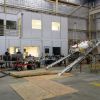 +21 +1
+21 +1NASA's quirky new lunar rover will be the first to cruise the moon's south pole
It’s no simple feat to send a rover to space, land it on a celestial body, and get the wheels rolling. NASA has used all kinds of techniques: The Pathfinder rover landed on Mars in 1997 inside a cluster of airbags, then rolled down its landing vehicle’s “petals,” which bloomed open like a flower, to the dusty surface. Cables attached to a rocket-powered “sky crane” spacecraft dropped the Perseverance Mars rover to the Red Planet’s surface in 2021.
-
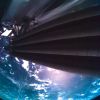 +4 +1
+4 +1Solving the RIME deployment mystery
When the RIME antenna on ESA’s Juice mission failed to deploy a few days after launch, the engineering teams faced the mighty challenge to understand the fault and rectify it. At stake was a chance to see inside Jupiter’s mysterious icy moons.
-
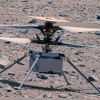 +20 +1
+20 +1Ingenuity helicopter phones home from Mars after 63-day silence
After 63 days of silence, the Mars Ingenuity helicopter is talking again. The little chopper took to the Martian skies on April 26 for its 52nd flight but lost contact with mission controllers before landing — creating a monthslong communications blackout.
-
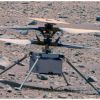 +2 +1
+2 +1NASA Re-Establishes Contact With Mars Ingenuity Helicopter
Washington: The official mission logbook now lists the Ingenuity Mars Helicopter's 52nd flight as a success. The trip took place on April 26 but mission controllers at NASA's Jet Propulsion Laboratory in Southern California lost communication with the chopper as it dropped towards the Mars surface for landing.
-
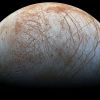 +25 +1
+25 +1NASA to develop oxygen, water on the moon within the next decade
NASA is looking to develop resources on the moon that initially include oxygen and water, and eventually may expand to iron and rare earths, and has already taken steps toward excavating moon soil in 2032, a scientist said on Wednesday.
-
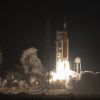 +18 +1
+18 +1NASA aims to perform lunar mining trial within 10 years
NASA's Artemis missions and its upcoming lunar Gateway station project are part of its plans to establish a permanent presence on the Moon. Key to that will be the extraction of resources from the lunar surface, and NASA has already taken important steps toward mining moon soil by 2032, a scientist said today, June 28, according to a Reuters report.
-
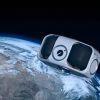 +3 +1
+3 +1SpaceX veteran Tom Mueller targets space service economy with tug business
Though SpaceX founder Elon Musk most often commands headline, the story of the private space startup hinges on a collection of key early figures. One is Tom Mueller, the famed space propulsion expert who ran development of SpaceX’s rocket engines and helped crack the code on reusability, the concept SpaceX has pioneered that has dramatically driven launch costs lower.
-
 +15 +1
+15 +1Watch live as two Russian cosmonauts conduct spacewalk
Though we all have differences, there’s one commonality that has prevailed for all of humanity: we are all floating on a rock, flying through outer space at over a million miles an hour. Thanks to the rapid advancement of technology in the past century, we can observe much more of the universe than we ever thought possible.
-
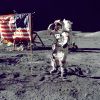 +20 +1
+20 +1NASA claims that life can exist on the Moon. It is reportedly not unrealistic.
The Space website brings news about what scientists will be investigating during the upcoming journey to the Moon. NASA. According to these findings, certain forms of life could potentially sustain themselves in the lunar conditions. One of the scientists, named Prabal Saxena, provides detailed explanations.
-
 +18 +1
+18 +1Boeing sued for allegedly stealing IP, counterfeiting tools used on NASA projects
Wilson Aerospace, a family-run tools company based in Colorado, is suing Boeing for a wide range of claims concerning allegedly stolen intellectual property.
-
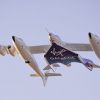 +3 +1
+3 +1Virgin Galactic attempts final test flight before beginning ticketed space trips
Virgin Galactic is preparing to launch its first spaceflight in nearly two years on Thursday, as the space tourism company aims to pass a final test before flying commercial passengers. Called Unity 25, the mission represents the company’s fifth spaceflight to date and is launching out of Spaceport America in New Mexico.
-
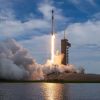 +28 +1
+28 +1SpaceX launches tenth crewed mission, third fully commercial flight
SpaceX on Sunday evening launched a commercial mission to the International Space Station carrying four people, including former NASA astronaut Peggy Whitson. This "Axiom-2" mission was commanded by Whitson and carried a paying customer named John Shoffner, who served as pilot, as well as two Saudi Arabian mission specialists, Ali al-Qarni and Rayyanah Barnawi.
-
 +20 +1
+20 +1Can NASA's Artemis moon missions count on using lunar water ice?
We are on the cusp of learning far more about the projected icy situation of the moon's permanently shadowed regions, or PSRs. Multiple nations are eying the moon's south pole with research teams plotting out how and where to explore the bottoms of the sun-shy features.
-
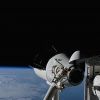 +4 +1
+4 +1Dragon Crew Ship Docks to New Port
The SpaceX Dragon, with Expedition 69 crew members Steve Bowen and Woody Hoburg of NASA, UAE (United Arab Emirates) astronaut Sultan Alneyadi, and Roscosmos cosmonaut Andrey Fedyaev aboard, has successfully docked to the forward port of the Harmony module of the International Space Station at 8:01 a.m. EDT.
-
 +3 +1
+3 +1Astronaut Buzz Aldrin named honorary brigadier general, member of Space Force
Former astronaut Buzz Aldrin was named an honorary brigadier general in the U.S. Air Force and made an honorary member of the U.S. Space Force on Friday, more than 50 years after he first set foot on the moon.
-
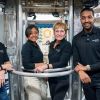 +17 +1
+17 +1SpaceX won't launch next private astronaut crew for Axiom Space in early May after all
The second-ever private astronaut mission to the International Space Station (ISS) won't launch in the next few days after all. The Houston-based company Axiom Space had been targeting May 8 for the launch of its Ax-2 mission, which will send four people to the ISS aboard a SpaceX Dragon capsule for a roughly 10-day stay.
-
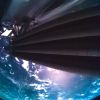 +22 +1
+22 +1Europe’s major new interplanetary spacecraft has a slight problem
It has now been two weeks since the on-target launch of the European Space Agency's 1.5 billion euro probe that is bound for the moons of Jupiter. This process had been going well until the space agency attempted to extend a 16-meter-long antenna that is part of its radar instrument. The Radar for Icy Moons Exploration, or RIME, is an important scientific instrument on the spacecraft because its ground-penetrating radar will allow for examinations of the interior of intriguing moons such as Europa and Ganymede.
-
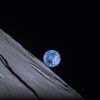 +17 +1
+17 +1Days before dying, Japan's lunar lander snaps glorious photo of Earth during a total solar eclipse
Japan's Hakuto-R lander may have crashed on the moon, but the spacecraft still sent back valuable images.
-
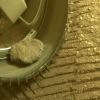 +30 +1
+30 +1NASA's Perseverance rover loses its hitchhiking 'pet rock' after more than a year together on Mars
The rover has finally lost a pesky rock that had become lodged in its front left wheel "like a pebble in its shoe." The stone had accompanied the rover for more than half its time on the Red Planet.
-
 +15 +1
+15 +1Star quality: Russia premieres first feature film shot in space
The first feature film shot in space has premiered in Russian cinemas, with Moscow celebrating beating a rival Hollywood project amid a confrontation with the west. The Challenge is about a surgeon dispatched to the International Space Station to save an injured cosmonaut. Russia sent an actor and a film director for a 12-day stint on the ISS in October 2021 to film scenes onboard the orbiting laboratory.
Submit a link
Start a discussion




















